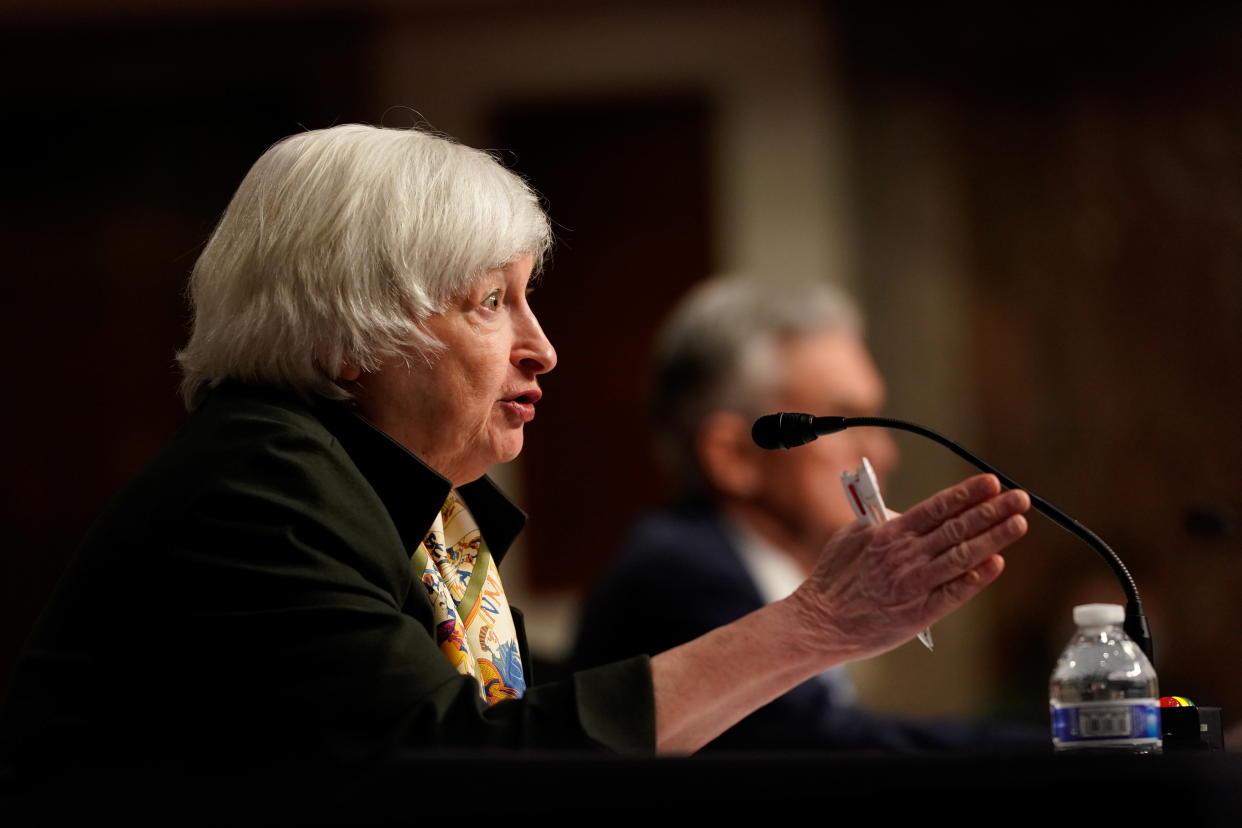Even Trump-aligned lawmakers are resisting his advice on the debt ceiling
Donald Trump is ready to go nuclear over the debt limit fight.
In multiple statements in recent weeks, the former president told his allies to stop at nothing when it comes to using the debt limit as leverage to block the centerpiece of President Biden’s domestic agenda, the Build Back Better Act.
Trump has even suggested that a government default – which experts say could tip the U.S. economy into a recession – is preferable to a Biden legislative win. He wrote on his website that Republicans should use the debt negotiations as their “Trump Card” and “[p]lay it and mean it, because the debt ceiling is far less destructive than the [Build Back Better] bill that [Democrats] will otherwise successfully pass.”
Yahoo Finance surveyed dozens of Trump-aligned lawmakers in Congress and few of the respondents jumped at the chance to say they're taking the former president’s tactical advice.
“Well, let me start by saying I did not know what the Trump Card was until today,” Rep. Pete Sessions (R., Texas) said in an interview this week. “I try and have my views be my views,” he said. Sessions voted with Trump 97.9% of the time in recent years, according to one calculation, including the Jan. 6 vote to overturn the 2020 election.

His position is echoed by many moderate and conservative GOP voices in that he won’t be voting for any debt limit increase, but also wouldn’t commit to taking the further step – urged by Trump – and do everything he can to block Democratic efforts. Democrats need to “take responsibility for their policies,” Sessions said.
Sen. John Cornyn (R., Texas), as another example, recently said on the Senate floor that Democrats will have to raise the debt ceiling on their own to avoid a “financial crisis.”
‘Extremely destructive to the US economy’
The U.S. could default on Dec. 15 or in the weeks that follow, missing payments for the first time in history. Treasury Secretary Janet Yellen recently told lawmakers, “we will eviscerate our current recovery” if the issue is left unaddressed.
Experts warn that a debt default could cause the stock market to plummet, trigger a recession, and cause chaos in global financial markets. Raising the debt ceiling does not directly impact future spending, rather it allows the Treasury to pay for previously approved spending.

A spokesperson for Rep. Ralph Norman (R., S.C.) agreed that a default would be extremely destructive: “Rep. Norman expects the Democrats to take responsibility for the trillions of dollars they’ve added to the national debt over the last year.”
‘Republicans will not provide the votes’
Behind the scenes on Capitol Hill this week, Senate Majority Leader Chuck Schumer (D., N.Y.) and Minority Leader Mitch McConnell (R., Ky.) have engaged in conversations on a way around the current impasse. The talks have centered around a long-term lift of the debt ceiling that could neutralize the issue beyond the 2022 elections, according to Punchbowl News.
Rep. Bob Good (R., Va.) told Yahoo Finance in a statement that “Sen. McConnell should stick to his original negotiating position that Republicans will not provide the votes to facilitate the Democrats’ massive spending spree.”
During the last go-around, McConnell promised no Republican votes for a debt ceiling increase, but backed down and ended up voting alongside 10 other Republican senators to allow Democrats to take up the bill, which then passed with just 50 Democratic votes.
The move gave the Treasury a reprieve of a few months and Trump has repeatedly attacked McConnell for it, recently calling it “idiotic.” A spokesperson for Rep. Marjorie Taylor Greene (R., Ga.) – perhaps Trump’s most outspoken advocate in Congress – echoed the criticism, pointing Yahoo Finance to a series of Greene'stweets during the last round of debt ceiling negotiations, including one calling on McConnell to “Stop selling out!”

Nonetheless, Republicans now appear largely content to let Democrats take the burden – and the political blame – for raising the debt limit as long as they can help as little as possible.
A recent idea floated by Sen. Joe Manchin (D., W.V.) would allow the Democrats to use the reconciliation process in an expedited manner, which would require Republican assent to allow consideration to proceed without blocking it. In an interview with Yahoo Finance Tuesday, Sen. Sherrod Brown (D., Ohio) noted that the reconciliation process without that could take too long and lead to days and days of Republican amendments for “irrelevant kinds of votes to get to it.”
Rep. Buddy Carter (R., Ga.) told Yahoo Finance that “the question isn't whether the U.S. should default on its payments; the question is why Democrats are ramming through economically disastrous legislation.” It's a “dangerous game of fiscal brinksmanship,” he said.
A spokesperson for Rep. Darrell Issa (R., Calif.) added that the focus was on next year's elections, predicting that voters would reject the bills alongside the debt limit increases. Next year’s elections "can’t come soon enough," he said.
Sessions notes that between the two debt ceiling fights came the recent elections in Virginia and New Jersey. He hopes Democrats “have had a chance to see, as a result of the election, the anxiety that is on voters', constituents', taxpayers', Americans' minds.” The anxiety will increase “with the crisis that they are continuing.”
Ben Werschkul is a writer and producer for Yahoo Finance in Washington, DC.
US government could default ‘as soon as mid-December’ without action: Analysts
This element of Biden’s agenda ‘has led to higher inflation’: Congress’s Budget Chief
Read the latest financial and business news from Yahoo Finance
Follow Yahoo Finance on Twitter, Facebook, Instagram, Flipboard, LinkedIn, YouTube, and reddit.
